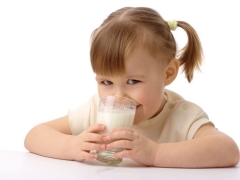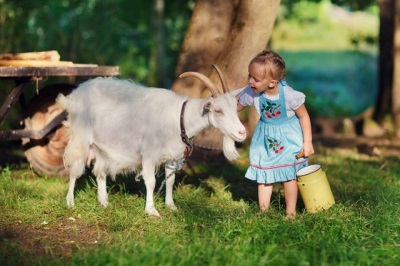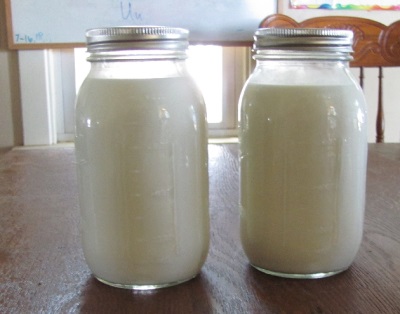At what age can goat milk be given to a baby?
Without a doubt, milk from the breast of the mother is the most useful and valuable for any infant, but sometimes there is a situation when breastfeeding is impossible. In this case, the mother thinks about the alternative, for example, goat milk. Is it possible to give them a baby after birth? At what age is it permissible to introduce it into complementary foods and how to do it correctly? Let's figure it out.
What is useful?
- Proteins in the composition contain all the amino acids that are important for the growth of the child's body.
- The child receives vitamins, magnesium, calcium and other beneficial substances.
- It is absorbed in the children's intestines more easily than from a cow, because its proteins are lighter, and the size of molecules of fats is smaller.
- In the stomach, it coagulates to form small balls, and the process itself resembles the digestion of breast milk.
- Allergy to it appears much less frequently than cow's milk, which allows us to recommend it for allergy sufferers with intolerance to cow's milk proteins and for atopic dermatitis.
- Fresh goat milk has antibacterial properties.
- The use of such a dairy product helps to eliminate dysbiosis.
- Due to the presence of taurine, such a product is useful for immunity and helps to resist colds.
- Since the lactose content is very low, this product is approved for the nutrition of lactase deficient children.
You will learn more about the benefits by watching the program “About the Most Important”.
How many months can I give to children?
Most pediatricians are not advised to introduce goat milk in the diet of children earlier than 1 year. This product is unacceptable in the nutrition of the infant of the first 6 months, so even in the divorced state it can not be given to either a month-old baby or a two-month-old infant. Such small children should be fed only breast milk.
If at an early age there is a need to replace human milk, it is best to choose an adapted mixture. Moreover, if the baby is allergic to cow protein, the mother can pick up a mixture based on goat's milk. This product contains it in a dry form, which is cleaned and balanced to meet the needs of infants up to a year.
From 9 months of age, breastfed babies can include goat's milk as one of the porridge components in the diet. For artificial children, porridge on it can be offered a little earlier - from 7-8 months. Also, babies of this age can be given products on such milk, for example, cottage cheese.
The age of 12 months is called the minimum for most doctors when you can give both goat and cow's milk instead of a mixture. So, it should not be introduced into the children's diet earlier than a year, and in order to give it to a one-year-old child, you first need to figure out how to dilute such a product with water, because under the age of 3 years old, goat milk is not recommended.
Why not give children up to a year?
Goat milk, introduced into the infant's diet too early, can adversely affect its health for such reasons:
- In this product, the protein is contained in much larger quantities than in breast milk. Excess casein, although it is digested more easily than from cow's milk, still exerts a greater load on the intestines of infants in the first year of life.
- Fatness significantly exceeds the permissible at an early age, and there is no lipase in its composition. For this reason, it needs to be diluted, but even when diluted it can cause problems with digestion, since the gastrointestinal tract of babies younger than one year old is not sufficiently developed to digest the milk of animals. In addition, after dilution, valuable qualities are partially lost.
- Excessive calcium and phosphorus in such a product provokes the development of rickets in babies. Phosphorus is absorbed by the body of the child in an increased amount, which causes the kidney crumbs to work in a heightened mode. As a result, such a necessary baby calcium is displayed along with excess phosphorus. At the same time, the baby also loses other useful substances, and also risks to get dehydration.
- It contains very few vitamins A and D, there is almost no iron and folic acid, because of which, the development of an infant transferred to such nutrition instead of mother's milk or a suitable age mix may be delayed. Such children develop anemia and some other diseases.
Contraindications
Drinking milk from goats is not recommended if you are hypersensitive to such a product. Allergic reactions are rare, but still possible. In addition, its use should be avoided in diseases of the pancreas.
Opinion Komarovsky
A well-known doctor believes that goat's milk is undeservedly attached great importance, but in fact the benefits and harms of such a product are comparable with the properties of cow's. It also contains too much phosphorus and lacks many vitamins. The only difference is the stomach spreading process, which makes it suitable for feeding children with frequent regurgitation.
Komarovsky allows the feeding of babies with goat milk in a situation where there is no money for a good milk mixture, and there is a goat in the household. At the same time, a popular pediatrician advises giving it only to diluted so that the fat content of the final product is not higher than 2%.
You can listen to the commentary of Dr. Komarovsky in the video below.
How to choose and buy?
Babies should be given only quality milk, so the best option is a product from their own goat or goat close friends. If the product is purchased on the market, ask about the availability of a veterinary certificate. If you buy it in a store, carefully review the shelf life of the product.
Before you offer milk to your child, be sure to try it yourself. If the product has a foreign taste or smell, it is better not to offer it to children. Fresh goat milk can be stored in the refrigerator for up to three days.
Pasteurized or home-boiled goat milk is well stored in a ceramic or glass container in the refrigerator for up to 10 days. It can also be boiled and stored in an enamel pot, and metal for these purposes is not suitable. To save the product for a longer period without boiling, the milk can be frozen. After thawing and thoroughly stirring the product will be almost as fresh.
How to enter into the diet
If the baby is one year old and the mother is interested in how to transfer the baby to goat's milk, then it is important to remember these basic nuances:
- The product should be introduced gradually, starting with one spoon.
- The first time it is diluted 1 to 3, and then gradually reduce the added volume of water.
- The recommended amount of use per day for a child 1-3 years old is 200 ml.
- Boiling is required. It is acceptable to give it without heat treatment in a small amount only when the parents themselves care for the goat and are confident in its health.
Note that many children do not like this type of milk because of its specific smell.To force a child to try an unpleasant product should not be. If the pussy categorically refuses to drink it, offer the product a little later or mix it with a product that has long been familiar and beloved for the baby.
How to cook cottage cheese
Cottage cheese made from goat milk is very useful and is not inferior to traditional cottage cheese from cows milk.
To prepare it, take 1 liter of goat milk and proceed as follows:
- After pouring the milk into an enamel pot, heat it to about + 40 ° C.
- Gently add 700 grams of nonfat yogurt and mix.
- Remove the container from the heat and wrap it in a blanket.
- Leave the product to stand overnight.
- In the morning mix the compacted mass and put on fire.
- When the mixture warms over low heat for 20 minutes, stir it again. If you stir the curd gently and slowly from the bottom up, you get large flakes. If you stir the mass quickly in a circular motion, the consistency of the curd will be fine-grained.
- Heat the product to + 80 ° C, and then transfer the vessel to a large container filled with cool water.
- Wait for the mixture to cool, then pour it into a colander, in which you must first put a thick cloth that can pass the liquid.
- Tie a cloth, and then send the colander in the refrigerator, placing it in a bowl to collect the serum.
- Regularly drain the serum, which will merge from the colander.
- In a day, delicious fresh cottage cheese will be ready.
Comparison of the benefits of cow and goat milk, see the program "To live healthy."

































































